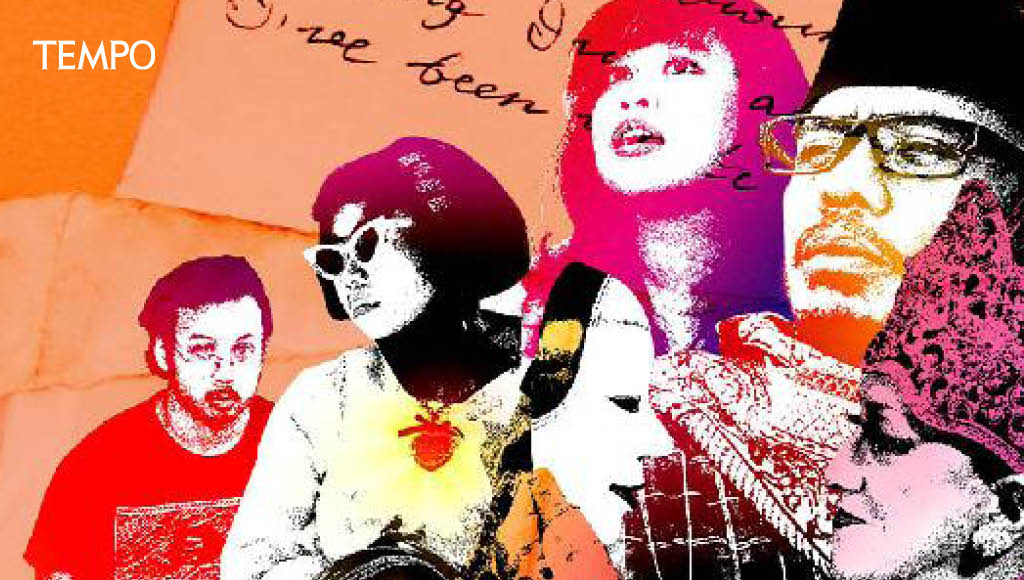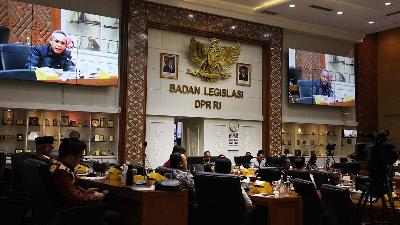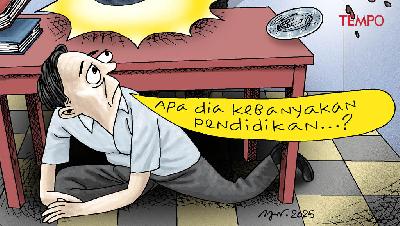When Politics Shackles, Art Liberates
Monday, January 27, 2025
Art liberates our politics that is so dreary nowadays. Freedom of expression is a requirement for artistic life.
arsip tempo : 174648240574.

POLITICS is the art of looking for trouble, then applying the wrong remedies. This classic quote from Groucho Marx becomes alarming when politics is in the hands of an authoritarian regime. As well as applying the wrong solutions to the many social problems we face these days, the government is also muzzling public criticism.
The censoring of an exhibition of paintings by Yos Suprapto at the Indonesian National Gallery at the end of December 2024 shows that the government has no respect for art as a component of public expression. The reason the government gave for closing the Yos Suprapto exhibition makes no sense: it was political because of the portrayal of former president Joko Widodo naked and being licked by his supporters, and as a king being intimate with men.
All art, said American playwright August Wilson, is political. This is because art is a meditation on the reality of society. Yos interprets public incidents on canvas. Therefore, Culture Minister Fadli Zon, who narrows the interpretation of art into simply something inappropriate and that offends the government, is a dangerous censor.
Korean movies and art exploded on the world stage after the nation’s Constitutional Court struck down the censorship law in 1996. Now, Korean movies are only governed by public ratings and the regulations about age appropriacy of audiences. All this came to a peak when the movie Parasite directed by Bong Joon-ho won the Oscar for best picture in 2020. Other Korean movies have cleverly portrayed corruption among law enforcement officials, the military and the executive, without any worries about being banned.
Movie makers have said that the development of the Korean movie industry was delayed by 50 years as a result of tight censorship following independence from Japanese occupation in 1948. The military regime censored art, meaning that artists were not free to explore themes. Artworks that criticized traditions or were seen as pornographic, yet alone mocked the government, were censored.
We learned from Korea: the main requirement for the development of art is freedom. Korean art has shown us that this freedom of expression can result in national economic growth. Hallyu, the wave of Korean culture, has now spread around the world. Therefore, if the Indonesian government is allergic to art, we are going back to the autocratic age.
The Special Report on Tempo’s 2024 Best Works of Art provides hope that Indonesian art is moving in a promising direction. Those artists whose works have been chosen explore themes by taking contemporary social problems as a starting point. Agrarian conflicts, violence against children, and the ecological crisis have been portrayed in a fresh way from a new viewpoint.
Natasha Tontey, for example, created an installation in the form of a huge door with a picture of the rear end of a Celebes crested macaque, a monkey endemic to North Sulawesi, with two anuses. A Minahasa artist, she used this crested macaque, with its black fur and pink rear end, to depict the conflict between animals and humans. The monkeys are seen as pests in plantations, and as a result, their population is in decline, and they are threatened with extinction.
Then there is the prose of Ziggy Zezsyazeoviennazabrizkie, which takes children’s stories back to their origin, a dark space as a medium of resistance. Children’s stories are in truth a warning to adults who take away spaces for playing in. Ziggy opposes the Walt Disney interpretation that changed the children’s stories of Hans Christian Andersen into sweet tales like a black and white heaven. In Ziggy’s stories, the characters fight back against the arbitrary thoughts of adults that seek to take over the children’s world.
The freedom of artists to express their ideas is accommodated by a medium outside control. Natasha Tontey did not display her art installation at the National Gallery, but at the Museum of Modern and Contemporary Art in Nusantara (Museum MACAN). And Ziggy’s novel Mari Pergi Lebih Jauh (lit. Let’s Go Further) was produced by Gramedia. Both of these are private institutions.
Therefore, if the government is unable to provide room for artistic expression, at the very least allows artists to explore it. Politics that is full of intrigue, dirty, without values, and does not fight for the interests of the people has become gloomy and disappointing. Art is a way for people to escape from this dreary situation.











